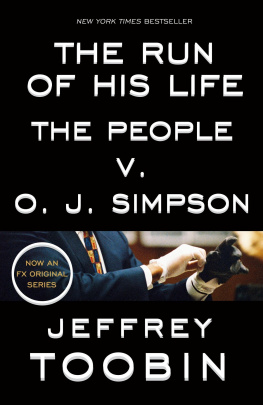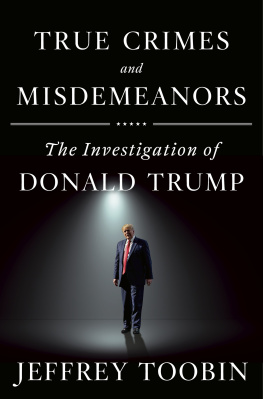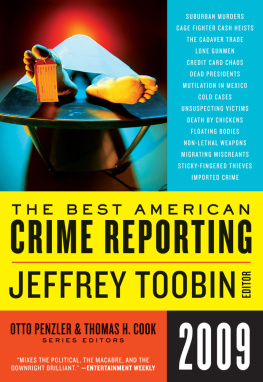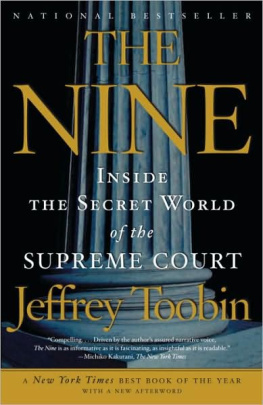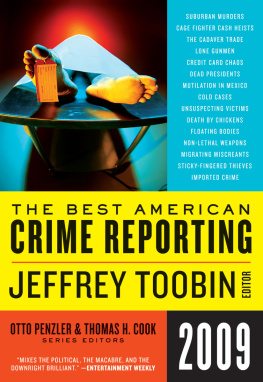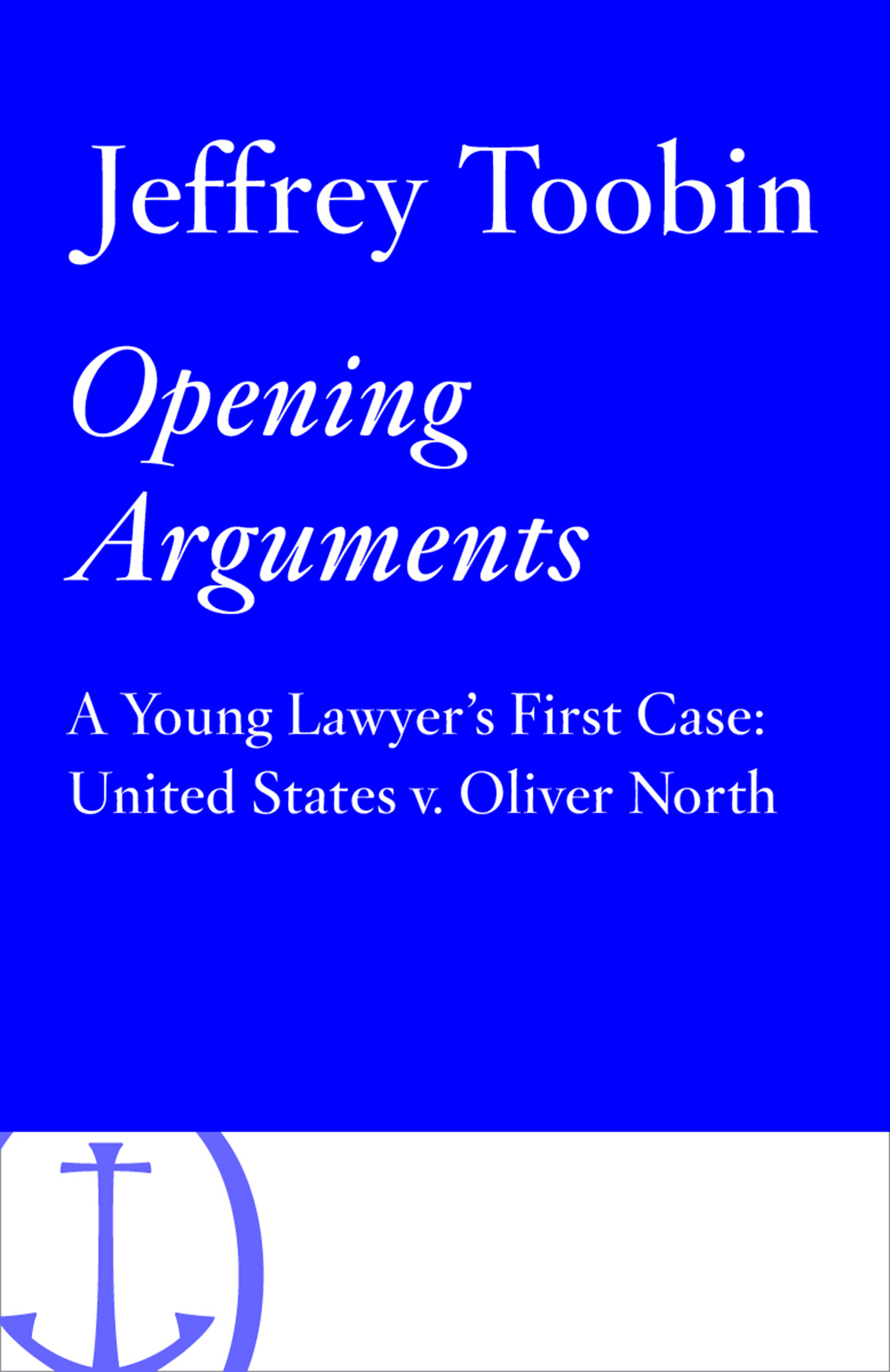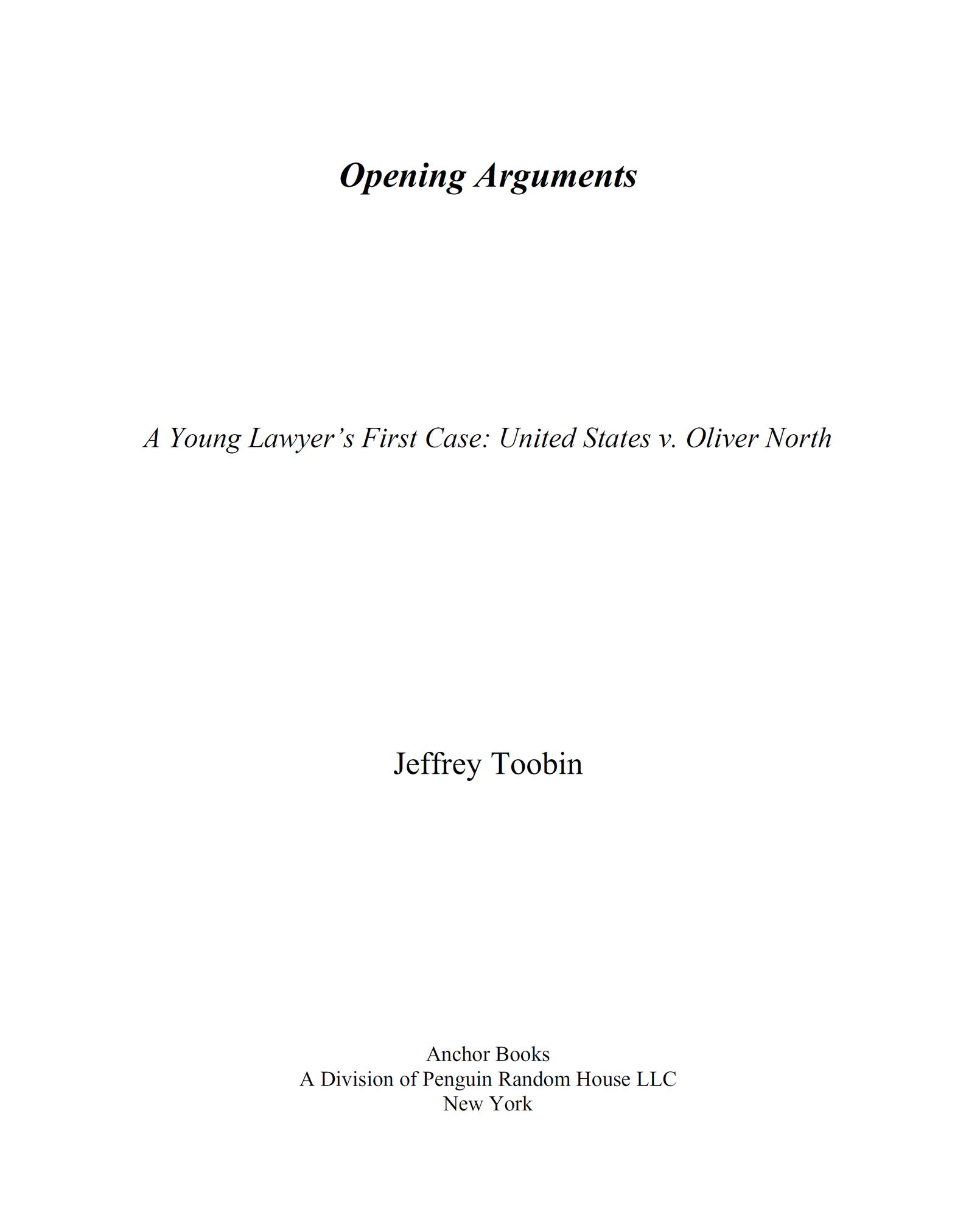Contents
Jeffrey Toobin
Opening Arguments
Jeffrey Toobin is the bestselling author of American Heiress, The Nine, for which he won the J. Anthony Lukas Book Prize, The Oath, Too Close to Call, A Vast Conspiracy, and The Run of His Life, which was made into the critically acclaimed FX series The People v. O. J. Simpson: American Crime Story. He is a staff writer at The New Yorker and the senior legal analyst at CNN.
www.jeffreytoobin.com
A LSO BY J EFFREY T OOBIN
The Run of His Life: The People v. O. J. Simpson
A Vast Conspiracy: The Real Story of the Sex Scandal That Nearly Brought Down a President
Too Close to Call: The Thirty- Six- Day Battle to Decide the 2000 Election
The Nine: Inside the Secret World of the Supreme Court
The Oath: The Obama White House and the Supreme Court
American Heiress: The Wild Saga of the Kidnapping, Crimes and Trial of Patty Hearst
FIRST ANCHOR BOOKS EDITION
Copyright 1991 by Jeffrey Toobin
All rights reserved. Published in the United States by Anchor Books, a division of Penguin Random House LLC, New York. Originally published in hardcover in the United States by Viking Penguin, a division of Penguin Books USA Inc., in 1991.
Anchor Books and colophon are registered trademarks of Penguin Random House LLC.
The Library of Congress has cataloged the Viking edition as follows:
Toobin, Jeffrey.
Opening arguments : a young lawyers first case, U.S. v. Oliver North/Jeffrey Toobin.
p.cm.
Includes index.
ISBN 0-670-83158-1
1. North, OliverTrials, litigation, etc.2. Trials (Conspiracy)Washington (D.C.)3. Iran-Contra Affair, 19854. ProsecutionUnited StatesDecision making.5. United StatesPolitics and government1981I. Title.
KF224.N66T661991
342.730412dc209050408
[347.302412]
Ebook ISBN9780525434450
www.anchorbooks.com
v4.1
a
TO THE MEMORY OF MY FATHER,
Jerry Toobin
Contents
PROLOGUE
Who Is Going to Argue for The Government?
T he room was called the ceremonial courtroom of the United States Courthouse for the District of Columbia, but the only ceremony it suggested was lunch at a suburban high school. So the courthouse powers recognized that they had to do something to salvage their showpiece, to give it a little of the majesty and solemnity lacking in the rooms bare bones.
The answer, they decided, was portraitsoil portraits, portraits by the dozen, portraits selected the way an interior decorator might use yards of books to lend dignity to a den. The pictures were of former judges of the District Court. But most of the portraits loomed up so high on the marble walls that their faces became almost indistinguishable, and their names, placed on simple brass markers, remained a mystery. The looming anonymous faces haunted the vast chamber.
On March 9, 1987, several hundred people packed the courtrooms rows of benches well before the 1:30 P.M. scheduled start of the days proceedings. To the left of the bench, at the table marked defendant, a handful of lawyers fidgeted and chatted while awaiting the judge. In the seat nearest the middle of the room was Guy Miller Struve, partner in the Wall Street firm of Davis, Polk & Wardwell. Over six feet tall, and with a pot belly warning of incipient middle age, Struve had a look of grim importance about him. He also evinced a sense of distance from the hubbub around him, in part because of an uncanny ability to concentrate but also because he was almost completely deaf, and at the moment his two large hearing aids were turned off. Struve arranged and rearranged four perfectly sharpened pencils into precise alignment on the table before him. He was nervous.
At the plaintiffs table, opposite Struve, was Barry Simon, whose intensity crackled where Struves simmered. Simon got up; he sat down; he played with his collar and with his pencils, which were neither sharpened nor arrayed in a straight line. To Simons right sat his partner at the Washington law firm of Williams & Connolly, Brendan V. Sullivan, Jr., who exuded an almost ostentatious calm in sharp contrast to the nervous energy being expended beside him. His hair a weathered gray, glasses a scholarly tortoiseshell, Sullivan appeared the picture of an old-fashioned lawyeran advisor, a counselor at law, as the old title had it, not a combatant.
Next to Sullivan sat his client, Lieutenant Colonel Oliver L. North of the United States Marine Corps. It wasnt the haircut with its ruler-straight partthe haircut that would epitomize his tremendous celebrity four months laterthat seemed so noticeable that Monday morning. Nor was it the perfectly pressed uniform, festooned with a fruit salad of decoration. It was, instead, Norths smile. There he sat, at the center of the biggest governmental scandal since Watergate, the subject of a major investigation aimed at putting him in jail, a platoon of cameramen camped out at his driveway every morning, and Ollie North was grinninggrinning from ear to ear.
At about a quarter to two, the clerk of the court let out the traditional cry:
All rise!
Many judges, affecting humility, prefer to wave their courtroom guests to their seats. No need for that pomp, they say, lets dispense with the ceremony and get to work.
Judge Barrington Parker of the United States District Court for the District of Columbia was not such a judge. His white hair nearly gone, his black skin pasty with age and ill health, Parker appeared at the door to the courtroom and did not even acknowledge the hushed crowd. Parker could scarcely move. He employed the plain metal crutches of the permanently impaired, his legs nearly useless as the result of an automobile accident a decade before. The audience held its collective breath and watched the judge struggle forward. The drama of the momenta hearing on Norths lightning bolt of a lawsuit seeking to have the independent counsel law declared unconstitutionalfocused on the figure inching his way across the massive bench. When he finally reached his seat, the audience exhaled and sat down with a thud.
Struve was ready to go. On leave from Davis Polk and now de facto second-in-command in the investigation led by his mentor, Independent Counsel (better known as Special Prosecutor) Lawrence E. Walsh, Struve was to argue that the statute under which Walsh was appointed was valid under the Constitution and that his investigation could go forward. As soon as Parker reached his seat, Struve, uninvited, vaulted to the lectern.
Parker had his own plans. Mr. Struve, he said dryly, I dont know what you were about to say at this point, but I am about to make a statement as to what this hearing is confined to this afternoon.
A master at the unctuous servility that most lawyers regard as mandatory before judges, Struve slunk back to his seat, saying, I believe it would be helpful for us all to hear Your Honors statement.
Very well. Parker cleared his throat and proceeded. As far as the Court is concerned, the hearing this afternoon is confined to the several motions to dismiss, one filed by the independent counsel, the other filed on behalf of the attorney general.
PARKERS


